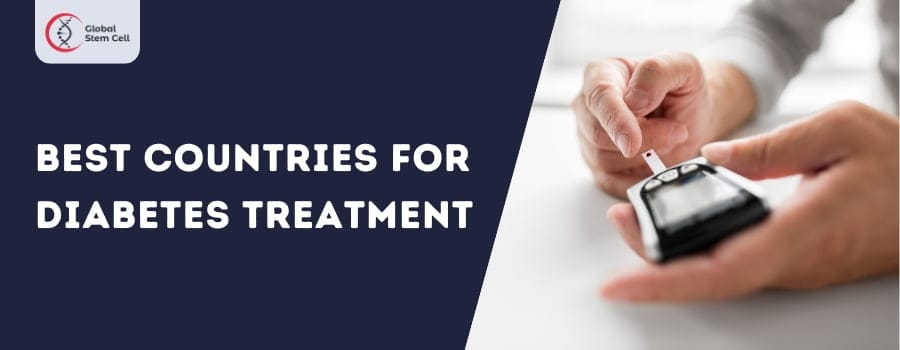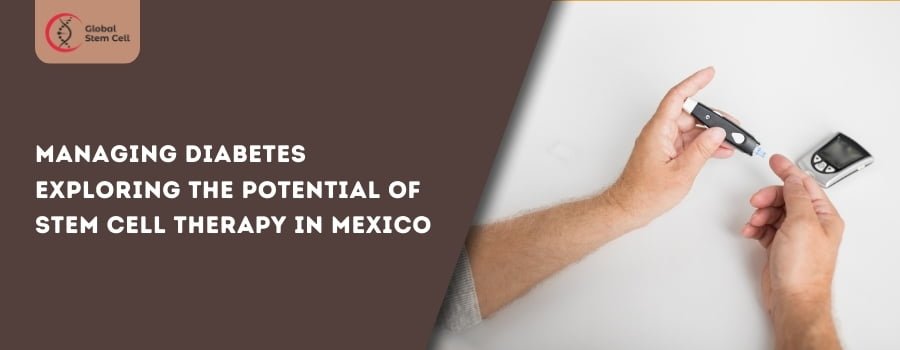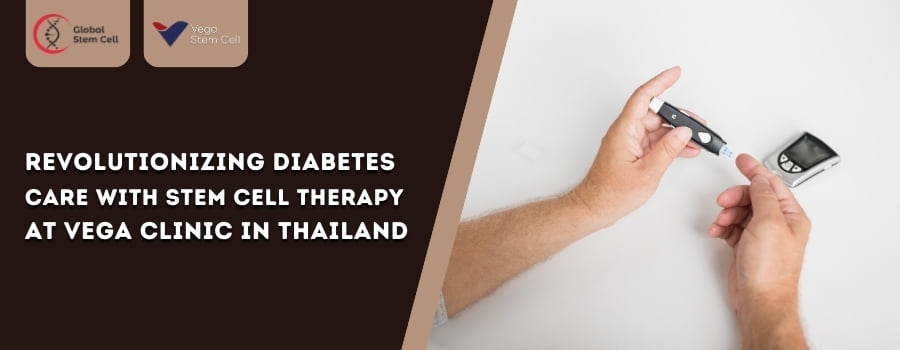
Stem Cell Therapy for Diabetes in Tijuana Mexico
Table of Content
Diabetes Mellitus, a chronic metabolic disorder affecting millions worldwide, has long been a challenge for medical professionals. In recent years, stem cell therapy has emerged as a promising alternative for treating this condition. One destination that has gained recognition for its advanced stem cell treatments is Tijuana, Mexico. This article explores the use of stem cell therapy for Diabetes Mellitus in Tijuana and its potential benefits.
Understanding Stem Cell Therapy
Stem cells are undifferentiated cells with the remarkable ability to self-renew and differentiate into various specialized cell types in the body. They serve as the building blocks of our tissues and organs, playing a vital role in development, growth, and repair processes.
There are two primary types of stem cells: pluripotent and multipotent.
- Pluripotent Stem Cells: Pluripotent stem cells are capable of differentiating into any cell type in the body, making them highly versatile. The most well-known example of pluripotent stem cells is embryonic stem cells (ESCs), which are derived from human embryos during the blastocyst stage. ESCs have the potential to generate all cell types found in the human body.
- Multipotent Stem Cells: Multipotent stem cells are more specialized than pluripotent stem cells and can differentiate into a limited range of cell types. They are typically found in specific tissues or organs and are responsible for their maintenance and repair. Examples of multipotent stem cells include hematopoietic stem cells (found in bone marrow and capable of forming various blood cell types) and mesenchymal stem cells (found in bone marrow, adipose tissue, and other sources, with the ability to differentiate into bone, cartilage, and fat cells).
Stem Cell Therapy and Diabetes
In the context of diabetes mellitus, stem cell therapy aims to utilize the regenerative properties of stem cells to improve the function of insulin-producing cells (beta cells) in the pancreas or address insulin resistance. Stem cells can be harvested from various sources, including embryonic tissue, umbilical cord blood, and adult tissues such as bone marrow and adipose tissue.
How stem cell therapy works in treating diabetes?
Stem cell therapy holds great potential in treating diabetes by targeting the underlying causes of the disease and promoting regeneration of damaged pancreatic tissue. The therapy involves the transplantation or stimulation of stem cells to restore or enhance the function of insulin-producing cells in the pancreas. Here’s how stem cell therapy works in treating diabetes:
Restoring Beta Cell Function in Type 1 Diabetes: Type 1 diabetes is characterized by the destruction of insulin-producing beta cells in the pancreas due to an autoimmune response. Stem cell therapy aims to replace or regenerate these lost beta cells to restore normal insulin production.
- Source of Stem Cells: Stem cells can be derived from various sources, including embryonic tissue, umbilical cord blood, or adult tissues such as bone marrow or adipose tissue. These stem cells are manipulated in the laboratory to differentiate into functional beta cells or precursor cells that can mature into beta cells.
- Transplantation: The generated beta cells or precursor cells are then transplanted into the patient’s pancreas through various techniques, such as injection into the pancreatic blood vessels or embedding them in a supportive scaffold. The transplanted cells are expected to integrate into the existing pancreatic tissue and start producing insulin in response to glucose levels in the blood.
- Immune System Regulation: In Type 1 diabetes, there is a risk of the immune system attacking the newly transplanted beta cells. To prevent this, researchers are exploring methods to protect the transplanted cells, such as encapsulating them in a protective barrier or using immunosuppressive drugs.
Reversing Insulin Resistance in Type 2 Diabetes: Type 2 diabetes is characterized by insulin resistance, where the body’s cells become less responsive to insulin. Stem cell therapy aims to address this resistance and improve insulin sensitivity.
- Mesenchymal Stem Cells (MSCs): MSCs, a type of adult stem cell, have shown potential in treating Type 2 diabetes. When transplanted, MSCs release factors that reduce inflammation and promote tissue repair. They also have the ability to differentiate into cells that contribute to the regeneration of pancreatic tissue.
- Paracrine Effect: MSCs exert their beneficial effects through a paracrine mechanism, wherein they secrete growth factors and cytokines that stimulate the regeneration of damaged pancreatic tissue, enhance insulin sensitivity in target tissues, and modulate the immune system response.
- Anti-inflammatory Effects: Stem cells possess anti-inflammatory properties that can help reduce the chronic low-grade inflammation associated with insulin resistance. By alleviating inflammation, they may improve the functioning of insulin-producing cells and promote insulin sensitivity in peripheral tissues.
The Potential of Stem Cell Therapy for Diabetes
Stem cell therapy holds immense potential in the field of diabetes treatment, offering a revolutionary approach to address the root causes of the disease and potentially provide long-term benefits. Here are some key aspects highlighting the potential of stem cell therapy for diabetes:
- Addressing the Root Cause: Unlike traditional treatments that focus on managing symptoms, stem cell therapy aims to target the underlying causes of diabetes. By replenishing or regenerating insulin-producing beta cells in Type 1 diabetes or improving insulin sensitivity in Type 2 diabetes, stem cell therapy addresses the core dysfunctions contributing to the disease.
- Beta Cell Regeneration and Restoration: In Type 1 diabetes, the destruction of beta cells leads to insulin deficiency. Stem cell therapy offers the potential to regenerate or restore these beta cells, either through the transplantation of functional beta cells or by stimulating the proliferation and maturation of precursor cells into fully functional beta cells. This approach holds promise for restoring normal insulin production and achieving better glucose control.
- Insulin Sensitivity Improvement: In Type 2 diabetes, insulin resistance is a key factor contributing to high blood sugar levels. Stem cell therapy, particularly using mesenchymal stem cells (MSCs), has shown potential in addressing insulin resistance. MSCs release factors that promote tissue repair, reduce inflammation, and enhance insulin sensitivity in peripheral tissues. By improving insulin sensitivity, stem cell therapy may help restore glucose homeostasis and reduce the reliance on exogenous insulin.
- Potential for Disease Modification: Stem cell therapy has the potential to modify the course of the disease, offering more than just symptom management. By addressing the underlying cellular and molecular dysfunctions, stem cells have the ability to promote regeneration and repair in the pancreatic tissue, potentially leading to sustained improvements in insulin production and glucose control. This could result in a reduced risk of diabetes-related complications and an overall improvement in the quality of life for patients.
- Personalized Medicine Approach: Stem cell therapy can be tailored to individual patients, taking into account factors such as disease severity, immune compatibility, and treatment response. This personalized medicine approach allows for customized treatment plans that maximize the therapeutic benefits for each patient, potentially leading to better outcomes.
- Potential for Combination Therapies: Stem cell therapy can be combined with other treatment modalities to enhance its effectiveness. For example, stem cell transplantation can be complemented with immunomodulatory drugs or biomaterial scaffolds to improve cell survival and engraftment. The integration of stem cell therapy with other emerging technologies, such as gene editing or tissue engineering, holds even greater promise for advancing diabetes treatment.
- Reduction in Diabetes-Related Complications: By addressing the underlying causes of diabetes and achieving better glucose control, stem cell therapy has the potential to reduce the risk of long-term complications associated with the disease. These complications include cardiovascular diseases, kidney problems, neuropathy, retinopathy, and impaired wound healing.
Best Stem Cell Centers in Tijuana Mexico
There are several stem cell centers in Tijuana Mexico that are well-known for their high-quality treatments and experienced medical staff. Here are some of the best stem cell centers in Tijuana Mexico:
[svc_post_layout grid_link_target=”nw” svc_excerpt_length=”0″ hide_showmore=”yes” dexcerpt=”yes” dcategory=”yes” dmeta_data=”yes” dsocial=”yes” dpost_popup=”yes” dimg_popup=”yes” dfeatured=”yes” query_loop=”size:3|order_by:date|order:DESC|post_type:stem-cell-centers|by_id:351403,485689,485904″ line_color=”#dd3333″]
Tijuana, Mexico – A Hub for Stem Cell Treatment
Tijuana, Mexico has emerged as a notable hub for stem cell treatment, attracting patients from around the world seeking innovative and advanced therapies for various medical conditions, including diabetes. The city’s reputation in stem cell research and treatment has been growing steadily, making it an appealing destination for those seeking cutting-edge medical interventions. Here are several reasons why Tijuana has become a hub for stem cell treatment:
- World-Class Medical Facilities: Tijuana is home to state-of-the-art medical facilities that are equipped with the latest technology and infrastructure necessary for conducting stem cell therapies. These facilities adhere to international standards and regulations, ensuring high-quality care and patient safety.
- Expert Medical Professionals: The city boasts a pool of highly trained and experienced physicians and medical professionals who specialize in stem cell therapies. These experts have dedicated their careers to researching and developing innovative treatments, including stem cell therapies for various diseases, including diabetes. Their expertise and knowledge contribute to the success and advancement of stem cell treatments in Tijuana.
- Specialization in Stem Cell Therapies for Diabetes: Tijuana has positioned itself as a center of excellence for stem cell treatments, with a particular focus on diabetes. Medical professionals in the city have been at the forefront of clinical research and trials investigating the use of stem cells in treating diabetes. This specialization allows patients to access cutting-edge therapies specifically designed for their condition.
- Regulatory Standards and Patient Safety: Tijuana adheres to rigorous regulatory standards to ensure patient safety and ethical practices. Stem cell treatments are conducted in accordance with international guidelines and regulations. The clinics and medical facilities in Tijuana prioritize patient safety, maintaining strict protocols for the collection, processing, and administration of stem cells. This commitment to regulatory compliance provides patients with peace of mind when seeking treatment in the city.
- Affordability and Accessibility: Compared to some other countries, stem cell treatments in Tijuana often come at a more affordable price point. This affordability, combined with the accessibility of the city from various parts of the world, makes it an attractive option for patients seeking stem cell therapies. Patients can benefit from cutting-edge treatments without incurring exorbitant costs associated with similar therapies in other regions.
Take the first step towards innovative stem cell therapy for diabetes in Tijuana, Mexico. Contact us today to explore personalized treatment options and discover the potential for a brighter future.






